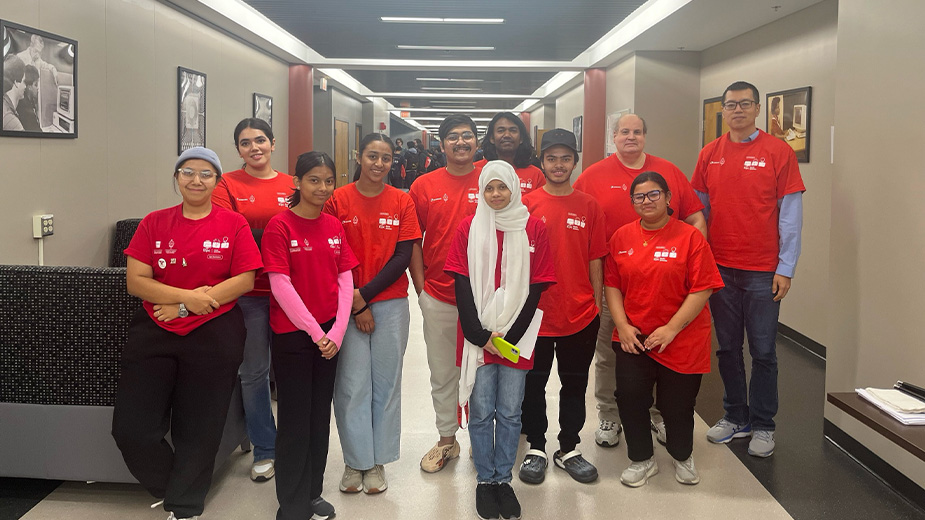Cossler’s ‘Startup 101’: Find the Next Market to Disrupt
YOUNGSTOWN, Ohio – For college students, there is no better time than now to begin a company. As Youngstown Business Incubator CEO Jim Cossler said Wednesday, it’s because of the tools at their disposal, the most valuable of which is who they are – college students.
“We’ve been in your shoes and we want to help,” Cossler said to a full classroom of students in Williamson Hall at Youngstown State University. “We’ve gotten through the gatekeepers of Fortune 500 companies for market research because a college student was the one making the call. … I’ve listened to people give up what are probably trade secrets because you’re just a college kid.”
As part of his “Startup 101” lecture, Cossler provided tips on beginning a tech startup. The most important thing, he said, is to have a verified market. That’s where the market research calls come into play. Without proof that someone wants to buy the product a startup company is pitching, he said, the idea isn’t worth much.
And it isn’t enough to have simply talked to people who said they liked the idea.
“You can’t do first-person verification. When someone tells you they love your idea, two things happen,” Cossler said. “It’s human nature. People say they like it so that, one, you like them more. And, two, so they don’t have to talk to you more about [it].”
Large corporations pay upward of $250,000 to conduct third-party research to determine if there’s a viable market, he said, even going as far as finding a price point. The YBI does it for potential companies for $250.
Incubators are also in the hunt for the next, as Cossler called it, “killer idea.” By their nature, such ideas disrupt current markets and come from “looking at something like an engineer would.”
What that means, Cossler explained, is to look at problems you encounter every day, no matter how minor, and think of a simpler way to do it.
“The two largest retailers on Earth own no inventory whatsoever – Alibaba and Amazon. The largest provider of hospitality rooms on the plant, who have more space than any hotel chain, doesn’t have a single hotel room – Airbnb,” he explained. “Find the next market that can be disrupted. Find out what’s vertical like those guys and you’re a billionaire.”
It’s also important to anticipate trends in the markets. Every day, Cossler related, he visits 15 or so technological news sites and reads the headlines, along with portions of the top stories. Hockey great Wayne Gretzky once said, “I skate to where the puck is going, not to where it’s been,” Cossler told the students.
“You can figure out where the world’s going and it’s not that hard,” he said. “What I try to do is take the information and figure out where the puck is going.”
Finally, it’s important to focus on business-to-business products and software for one simple reason: It’s easier and quicker. To start a clothing store, for example, a new business needs to invest in a storefront, merchandise and employees.
“You’re up to a million bucks in capital. If you come to us with an idea for a screen and it’s a killer idea, you don’t even need it. We’ll take care of it for you,” Cossler said.
There’s also a quick turnaround on figuring out whether an idea will succeed, sometimes as short as a few months. And for students who eventually will be looking for a job, that can be priceless.
“If everything is equal on a resume – GPA, major, experience – but you have startup experience and the other person doesn’t, I’ll hire the startup experience every time,” he said. “Almost every employer I talk to does the same thing. A startup cannot fail. There are only two outcomes: you either succeed or you learn some valuable lessons.”
Not all at the lecture were business students or even had a concrete idea for a startup business. Austin Hilt, pursuing a master’s degree in public health at YSU, came to the lecture simply because of the shifting business models in the health care industry.
“Business is very pervasive these days and I don’t think I could get by without an understanding of how business works,” Hilt said. “Just getting this experience will help me navigate that in the future.”
Hilt has toyed with the idea of a startup centering on addressing Youngstown’s food desert,” he said, and the lecture gave him a better appreciation of what he’ll need to do.
“I know there’s a definite need, but it made me think about how I’m going to go about it,” he said. “I have a capstone project going on and [Cossler] got me thinking about the mode of action for how to make it happen, especially with funding.”
Hari Iyer, also a candidate for a master’s in public health, said he hadn’t considered a startup before but would heed some of Cossler’s advice.
“This really got me thinking about going through my everyday activities and thinking like an engineer,” he said. “Things like asking how something I do all the time can be done better where everyone can find value in it and start a business model from it.”
People not students were also in attendance. Juanita Thompson had met with Cossler earlier in the day and he invited her to attend. While she’s still researching her idea – centered on intelligence software – and solidifying the concept, she called his advice “indispensable.”
“My take away was to always explore an idea and never walk away from it,” she said. “Sometimes we all have a good thought but we don’t act on it. It’s important to see it all the way through and do what’s necessary. I’m more motivated to stick with the YBI program and follow my concept through.”
Copyright 2024 The Business Journal, Youngstown, Ohio.



